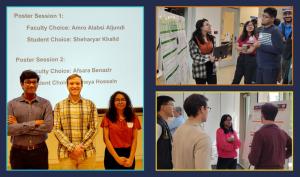
On October 3, 2023, the Computer Science Graduate Student Group (CSGSG) held their annual research symposium in Rice Hall. The event included a mix of talks from faculty and students, as well as two breakout poster sessions where graduate students presented their research. Awards were given at the conclusion of the event based for “Faculty’s Choice” and “Student’s Choice” from the two poster sessions. (Read on to find the results!)
Nakshatra Yalagach, Leadership Co-Rep with the CSGSG, provided insight to the event goals and outcomes.
“The research symposium was strategically designed with a dual purpose in mind. Firstly, it aimed to offer invaluable guidance to emerging Ph.D. students as they embark on their journey. Secondly, the symposium sought to facilitate a comprehensive understanding of ongoing research endeavors across various domains within computer science.
The symposium aspired to empower and educate the next generation of scholars, equipping them with the knowledge and perspective required to navigate the complexities of both academia and industry. The students received guidance on the diverse challenges they may encounter and the multitude of career paths available within their field of study. The faculty talks provided a platform for students to explore the breadth and depth of contemporary research in their discipline. It served as a valuable platform to foster academic and professional growth for aspiring computer science students.”
Two poster sessions took place before and after the group’s lunchtime.
Poster session 1 awards:
- Faculty Choice: Amro Alabsi Aljundi
- Student Choice: Sheharyar Khalid
Poster session 2 awards:
- Faculty Choice: Afsara Benazir
- Student Choice: Soneya Hossain
Highlights of some of the faculty talks:
David Evens: “ML Security and Privacy” - Prof. Evans talked about the need to audit AI systems, and why this poses challenges due to the nature of such systems as trained rather than programmed. He also summarized work students in his group are doing in auditing AI systems for bias, privacy, and security.
Wajih Ul Hassan: “System Security“ - Prof. Hassan discussed how to combat threat alert fatigue in enterprise settings. He pointed out that current enterprise security solutions are inadequate because they focus on individual events instead of employing holistic attack progression models informed by context. This approach leads to an overwhelming number of false positives, wastes hundreds of security analyst hours weekly, and exacerbates the issue of threat alert fatigue. To improve this situation, he suggested modeling entire system execution flows using data provenance graphs and analyzing historical context. This method would allow for more accurate assessment of alert suspiciousness.
Robbie Hott: “Thinking About Teaching?” – Prof. Hott focused on the teaching side of academia. He discussed how teaching-track and tenure-track positions differ or are similar across different universities and institutions, what it looks like to teach Computer Science to 500 students at the University of Virginia and the skills teaching faculty gain in this role, and some advice for graduate students interested in teaching to gain more experience in the classroom.
Chang Lou: “Securing a Bad Career in Ph.D. Program” – Prof. Lou talked about the three common pitfalls for Ph.D. students (advising relations, time management, work-life balance) and how to prevent issues with practical tips.
Mircea Stan: “Low Power and Processing in Memory” – Prof. Stan discussed how the latency and energy consumed by a main memory access is many orders of magnitude higher than for a CPU operation. Processing-in-Memory (PiM) tries to address this performance and power "memory wall" by moving some of the computation close to where the data resides. This opens up a lot of challenges (lack of memory foundry, difficult system integration, existing standards) but also many opportunities that can become great research topics for Computer Science and Computer Engineering research.